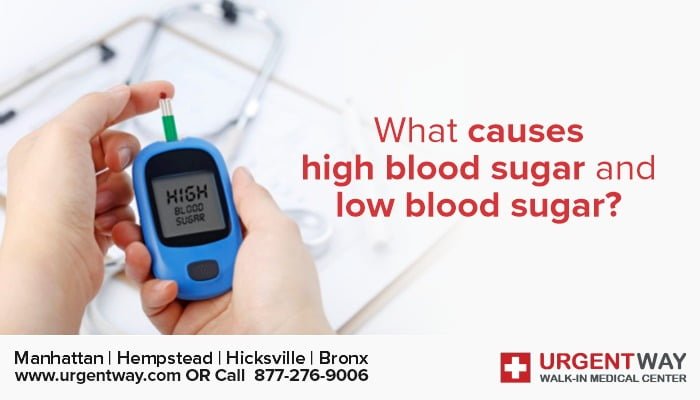The human body naturally has glucose in the blood to give the body’s organs energy. The high or low level of glucose in the blood can cause hyperglycemia or hypoglycemia, respectively. Less than 140mg/dL blood sugar level is normal. If the blood glucose level is greater than 180mg/dL, it is called hyperglycemia. If the blood glucose level is less than 70mg/dL, it is called hypoglycemia. Having a high or low blood sugar level indicates an underlying health condition that may require proper treatment. Many factors can affect blood glucose levels throughout the day: physical activity, stress, age, dehydration, illness, meal type, medications, menstrual periods, and alcohol.
Symptoms of low blood glucose
When blood glucose level drops too low, the following symptoms may arise:
- Dizziness
- Confusion
- Nervousness
- Chills
- Anxiety
- Sweating
- Hunger
- Pale skin
- Tingling lips
- Sleepiness
Symptoms of high blood glucose
When the human body doesn’t have insulin, then hyperglycemia may happen. The following symptoms may arise when the blood glucose level is too high than normal:
- Fatigue
- Headache
- Increased thirst
- Blurred vision
- Frequent urination
- Fatigue
- Difficulty concentrating
- Abdominal pain
- Vomiting
- Presence of ketones
The causes of high blood glucose and causes of low blood glucose vary from each other and depend on many factors.
Causes of high blood glucose
These are the following high blood glucose causes:
- The dose of insulin or medication which you are taking is not meeting your body’s needs.
- Your body is not using your natural insulin effectively.
- The quantity of your carbohydrate intake is not meeting the standards of your body’s natural insulin or insulin you inject.
- You’re less active in physical exercise.
- Physical factors such as cold, flu, or infection are affecting you.
- You forget or miss the insulin or glucose-lowering medicine.
- You’re using a steroid medicine for another health condition.
- Hormone disturbance which can cause Cushing syndrome may be the leading factor of high blood glucose
- Pancreatic diseases such as cystic fibrosis or pancreatic cancer may cause high blood glucose.
Causes of low blood glucose
The following may be common causes of low blood glucose:
- Taking insulin or diabetic medicines frequently.
- You’re missing your regular meal.
- You’re drinking too much alcohol.
- You’re increasing your physical activities as exercise without adjusting the medications.
- Some other underlying illnesses such as hepatitis or cirrhosis may cause hypoglycemia.
- The pancreatic tumor may cause too much production of insulin hormone in the blood, which can cause hypoglycemia.
- Sometimes, the brain tumor disturbs the hormone production from the pituitary gland, responsible for regulating insulin production, resulting in hypoglycemia.
What controls your sugar level?
Our diet and exercise control our sugar levels in the blood. Therefore, these two are the significant factors that play a vital role in causing hypoglycemia and hypoglycemia.
1) Diet
Intake of too many carbs or fewer carbs than usual can lead to high blood glucose and low blood glucose, respectively. If we take high carbs while sitting simultaneously, it can lead to a rise in glucose quickly. So, the use of the glycemic index is suggested to keep balance the blood glucose. Increasing the intake of fiber, decreasing carbohydrate intake, and drinking plenty of water may manage high blood glucose and low blood glucose.
2) Exercise
Being active and continuing participation in physical activities can effectively treat high blood glucose and low blood glucose. In addition, the habit of resistance training such as pushups and squats, choosing the right time to break a sweat, and drinking plenty of water can make us feel full with zero calories, resulting in a balance of blood glucose levels.
Glucose is naturally found in our blood to keep us active and healthy while giving us energy. A glucose level chart determines whether someone is experiencing high blood glucose or low blood glucose. The symptoms of high blood glucose and low blood glucose are different from each other. Causes of hypoglycemia and hyperglycemia are also varied from each other and depend on underlying health conditions and risk factors. Insulin is regulated by the pancreas and controlled by the pituitary gland, so stress and some other external factors also act as risk factors to increase the risk of hypoglycemia and hyperglycemia events. Diet and exercise play a vital role to cause or prevent high blood glucose and low blood glucose. Sometimes to treat underlying health conditions like cancer or cysts, proper medicines or even surgery may be suggested by doctors. Our eating habits can also help us to relieve hypoglycemia and hyperglycemia effectively while controlling insulin production and insulin sensitivity.


